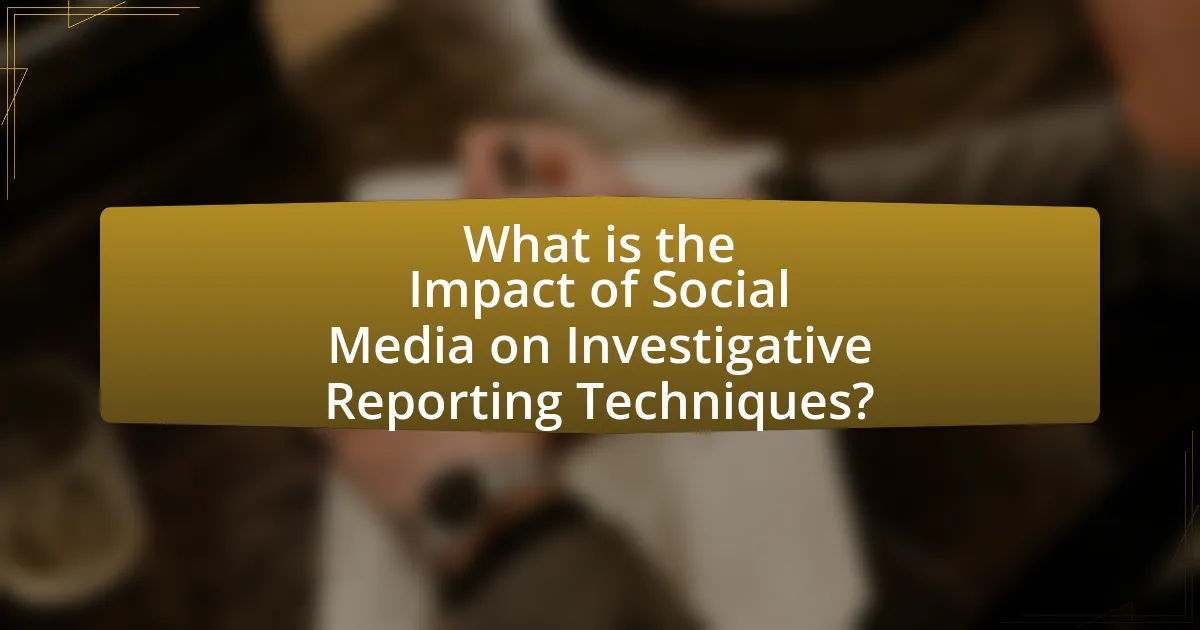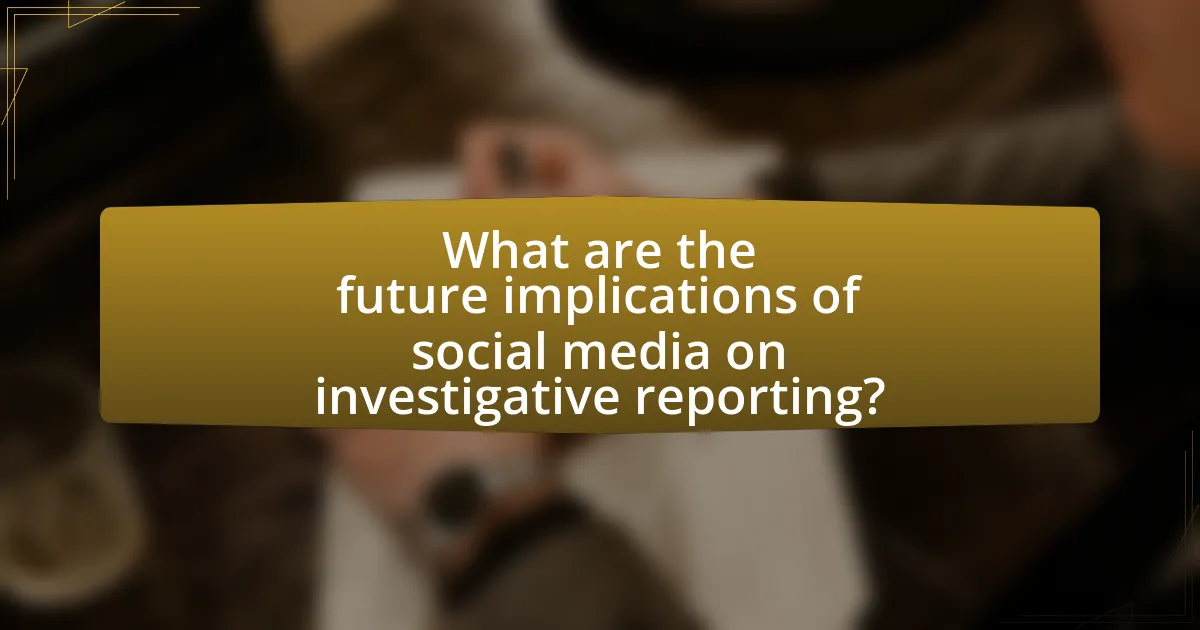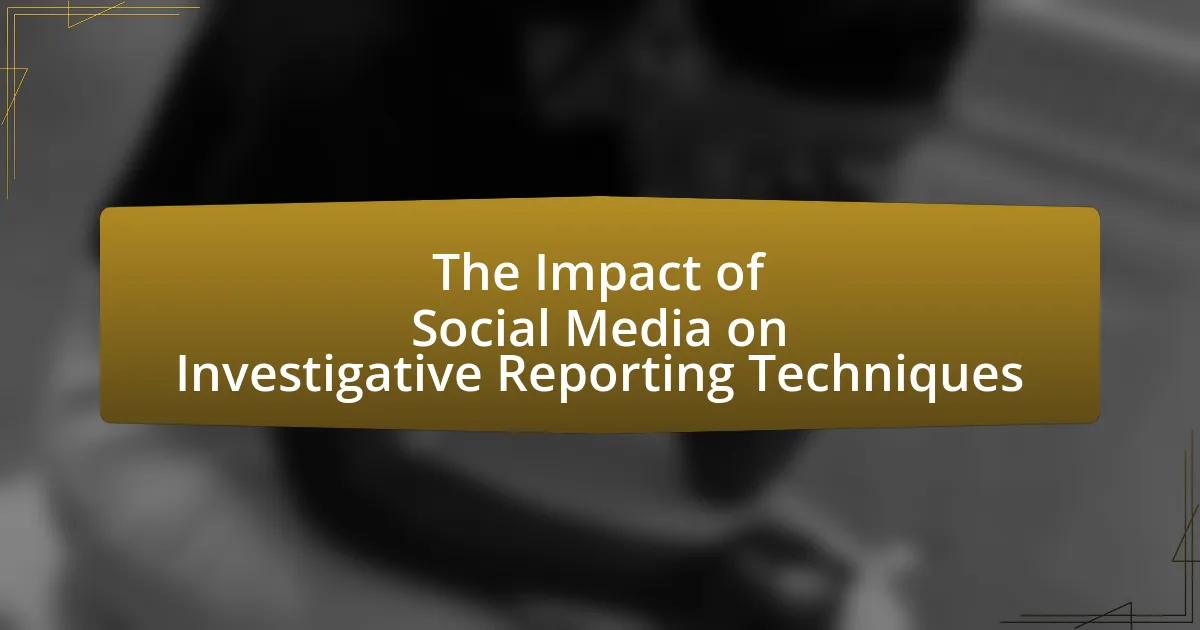The article examines the impact of social media on investigative reporting techniques, highlighting how platforms like Twitter and Facebook enhance information gathering, source verification, and audience engagement. It discusses the transformation of traditional reporting methods, the challenges posed by misinformation, and the ethical dilemmas that arise from using social media in investigations. Key changes in information gathering, the role of analytics, and the future implications of emerging technologies such as artificial intelligence and virtual reality are also explored, emphasizing the necessity for journalists to adhere to ethical standards while leveraging social media effectively.

What is the Impact of Social Media on Investigative Reporting Techniques?
Social media significantly enhances investigative reporting techniques by providing real-time access to information and facilitating direct communication with sources. Journalists utilize platforms like Twitter and Facebook to gather leads, monitor public sentiment, and engage with eyewitnesses, which can lead to more comprehensive and timely reporting. For instance, during major events such as protests or natural disasters, social media serves as a crucial tool for journalists to collect firsthand accounts and visual evidence, thereby enriching their investigations. Additionally, studies indicate that 64% of journalists use social media to verify information, highlighting its role in improving accuracy and accountability in reporting.
How has social media transformed traditional investigative reporting?
Social media has transformed traditional investigative reporting by enabling real-time information sharing and audience engagement. Journalists now utilize platforms like Twitter and Facebook to disseminate breaking news quickly, gather eyewitness accounts, and crowdsource information, which enhances the depth and speed of investigations. For instance, during the Arab Spring, social media played a crucial role in reporting on protests and government actions, allowing journalists to access information that was otherwise difficult to obtain. This shift has led to a more collaborative approach in journalism, where the public can contribute to investigations, thereby increasing transparency and accountability in reporting.
What are the key changes in information gathering due to social media?
Key changes in information gathering due to social media include the acceleration of real-time data access, the democratization of information sources, and the enhancement of audience engagement. Social media platforms enable journalists and investigators to access breaking news and updates instantly, allowing for quicker reporting and response times. Additionally, social media has shifted the landscape from traditional gatekeeping to a more open environment where anyone can share information, leading to a broader range of perspectives and sources. This shift has also fostered greater interaction between journalists and the public, allowing for crowdsourced information and tips that can enhance investigative efforts. According to a 2021 Pew Research Center study, 53% of journalists reported using social media as a primary tool for gathering news, highlighting its critical role in modern information gathering.
How do social media platforms facilitate source verification?
Social media platforms facilitate source verification by providing tools and features that allow users to assess the credibility of information and its sources. For instance, platforms like Twitter and Facebook enable users to check the authenticity of accounts through verification badges, which indicate that an account is legitimate and represents a real person or organization. Additionally, social media platforms often incorporate fact-checking partnerships, where third-party organizations review and verify claims made in posts, thereby enhancing the reliability of shared information. According to a study by the Pew Research Center, 64% of social media users have encountered misinformation, highlighting the importance of these verification mechanisms in combating false narratives.
What challenges does social media present to investigative reporting?
Social media presents significant challenges to investigative reporting, primarily through the spread of misinformation and the difficulty in verifying sources. Investigative reporters often rely on accurate information to build credible narratives, but social media platforms can amplify false claims rapidly, complicating the fact-checking process. For instance, a study by the Pew Research Center found that 64% of Americans believe that fabricated news stories cause confusion about basic facts, which directly impacts the integrity of investigative journalism. Additionally, the sheer volume of content generated on social media makes it challenging for reporters to discern credible sources from unreliable ones, leading to potential errors in reporting.
How does misinformation on social media affect reporting accuracy?
Misinformation on social media significantly undermines reporting accuracy by spreading false narratives that journalists may inadvertently incorporate into their work. This phenomenon occurs because reporters often rely on social media as a source of information, leading to the potential inclusion of unverified claims in news stories. A study by the Pew Research Center found that 64% of Americans believe that fabricated news stories cause confusion about the basic facts of current events, illustrating the widespread impact of misinformation on public perception and media integrity. Consequently, the prevalence of misinformation can lead to misreporting, eroding trust in journalism and complicating the verification process essential for accurate reporting.
What ethical dilemmas arise from using social media in investigations?
Using social media in investigations raises several ethical dilemmas, primarily concerning privacy, consent, and misinformation. Investigators often access personal information without explicit consent, which can violate individuals’ privacy rights. For instance, the unauthorized use of publicly available data can lead to ethical concerns about the boundaries of acceptable surveillance. Additionally, the potential for spreading misinformation is significant, as unverified information can be disseminated rapidly, leading to wrongful accusations or harm to innocent individuals. The ethical implications of these actions are compounded by the lack of clear regulations governing the use of social media data in investigations, creating a complex landscape where ethical standards may be inconsistently applied.

How do journalists utilize social media in their investigative processes?
Journalists utilize social media as a vital tool in their investigative processes by gathering information, sourcing leads, and engaging with audiences. They monitor platforms like Twitter and Facebook for real-time updates and public sentiment, which can reveal emerging stories or trends. For instance, during the Arab Spring, journalists relied on social media to obtain firsthand accounts and images from protestors, which significantly shaped their reporting. Additionally, social media allows journalists to connect with sources directly, facilitating interviews and obtaining documents or evidence that may not be accessible through traditional means. This integration of social media enhances the depth and immediacy of investigative reporting, making it a crucial component of modern journalism.
What tools and techniques do journalists employ on social media?
Journalists employ various tools and techniques on social media to enhance their reporting and engage with audiences. These include social media platforms like Twitter and Facebook for real-time news dissemination, audience interaction, and sourcing information. Additionally, journalists utilize analytics tools such as Hootsuite and Google Analytics to track engagement metrics and audience demographics, which inform their content strategies. Techniques such as hashtag tracking and social listening allow journalists to monitor trending topics and public sentiment, facilitating timely and relevant reporting. Furthermore, multimedia tools like Canva and Adobe Spark enable journalists to create visually appealing content that captures audience attention. These practices are supported by studies indicating that 62% of journalists use social media to gather information and connect with sources, highlighting its integral role in modern investigative reporting.
How do hashtags and trends aid in uncovering stories?
Hashtags and trends facilitate the discovery of stories by aggregating user-generated content around specific topics, making it easier for journalists and researchers to identify emerging narratives. By analyzing trending hashtags, investigative reporters can pinpoint significant events, public sentiments, and key issues that are gaining traction in real-time. For instance, during major events like protests or natural disasters, hashtags often serve as a focal point for eyewitness accounts and firsthand information, allowing reporters to gather diverse perspectives quickly. This method of content aggregation has been validated by studies showing that social media platforms can act as real-time news sources, with hashtags enabling the tracking of public discourse and sentiment analysis, thus enhancing the depth and breadth of investigative reporting.
What role do social media analytics play in investigative reporting?
Social media analytics play a crucial role in investigative reporting by providing journalists with insights into public sentiment, trends, and the dissemination of information. These analytics enable reporters to track conversations, identify key influencers, and analyze data patterns that can lead to uncovering stories or verifying facts. For instance, a study by the Pew Research Center found that 64% of journalists use social media to gather information for their reporting, highlighting its significance in the investigative process. By leveraging social media analytics, investigative reporters can enhance their research, validate sources, and ultimately produce more accurate and timely stories.
How do journalists engage with audiences through social media?
Journalists engage with audiences through social media by sharing news updates, soliciting feedback, and fostering discussions. This engagement allows journalists to reach a broader audience, as platforms like Twitter and Facebook enable real-time interaction and the dissemination of information to millions. For instance, a Pew Research Center study found that 62% of U.S. adults get news on social media, highlighting its significance in modern journalism. Additionally, journalists utilize social media to crowdsource information and gather public insights, enhancing the depth and accuracy of their reporting.
What strategies enhance audience interaction during investigations?
Strategies that enhance audience interaction during investigations include utilizing social media platforms for real-time engagement, encouraging user-generated content, and implementing interactive storytelling techniques. Social media platforms like Twitter and Facebook allow journalists to share updates and solicit feedback, fostering a two-way communication channel. User-generated content, such as eyewitness accounts or photos, can enrich the investigation and create a sense of community involvement. Interactive storytelling techniques, such as polls or live Q&A sessions, further engage the audience by allowing them to participate actively in the investigative process. These strategies have been shown to increase audience investment and trust in the reporting, as evidenced by studies indicating that interactive content can lead to higher engagement rates and audience retention.
How can feedback from social media users improve reporting quality?
Feedback from social media users can significantly improve reporting quality by providing real-time insights and diverse perspectives. This user-generated feedback allows journalists to identify inaccuracies, uncover new angles, and gauge public interest, thereby enhancing the relevance and accuracy of their reports. For instance, a study by the Pew Research Center found that 64% of journalists believe social media helps them discover new stories and sources, indicating its role in enriching the reporting process. Additionally, user comments and shares can highlight areas needing clarification or deeper investigation, prompting reporters to refine their narratives and ensure comprehensive coverage.

What are the future implications of social media on investigative reporting?
Social media will increasingly serve as a critical tool for investigative reporting, enhancing the speed and breadth of information gathering. Journalists can leverage platforms like Twitter and Facebook to access real-time updates, witness accounts, and public sentiment, which can significantly expedite the investigative process. For instance, during the Arab Spring, social media was instrumental in disseminating information quickly, allowing reporters to cover events as they unfolded. Furthermore, social media facilitates crowd-sourced investigations, enabling journalists to collaborate with the public and gather diverse perspectives and data. This trend is supported by the rise of platforms that allow users to share tips and evidence, such as the use of hashtags to aggregate information on specific topics. As a result, the future of investigative reporting will likely see a greater reliance on social media for sourcing information, verifying facts, and engaging with audiences, ultimately leading to more comprehensive and timely reporting.
How might emerging technologies influence investigative techniques?
Emerging technologies significantly enhance investigative techniques by providing advanced tools for data collection, analysis, and dissemination. For instance, artificial intelligence algorithms can analyze vast amounts of social media data to identify patterns and trends relevant to investigations, enabling quicker insights. Additionally, geolocation technologies allow investigators to track movements and verify alibis through social media posts, enhancing the accuracy of their findings. A study by the Pew Research Center indicates that 69% of adults in the U.S. use social media, making it a rich source of information for investigators. These technologies streamline the investigative process, improve accuracy, and facilitate real-time updates, ultimately transforming how investigations are conducted.
What role will artificial intelligence play in social media analysis?
Artificial intelligence will play a crucial role in social media analysis by enabling the automated processing and interpretation of vast amounts of data. AI algorithms can analyze user-generated content, identify trends, and extract sentiment, providing insights that are essential for understanding public opinion and behavior. For instance, a study by the Pew Research Center found that AI tools can process millions of social media posts in real-time, allowing for timely and informed decision-making in investigative reporting. This capability enhances the efficiency and accuracy of social media analysis, making it an indispensable tool for journalists and researchers in the field.
How could virtual reality change the way stories are reported?
Virtual reality could revolutionize story reporting by providing immersive experiences that allow audiences to engage with narratives in a more impactful way. This technology enables journalists to create 360-degree environments where viewers can explore scenes related to the story, enhancing emotional connection and understanding. For instance, a report on a natural disaster could allow viewers to virtually experience the aftermath, fostering empathy and a deeper grasp of the situation. Studies have shown that immersive storytelling can increase retention of information and emotional engagement, making VR a powerful tool for investigative reporting.
What best practices should journalists follow when using social media?
Journalists should prioritize accuracy, transparency, and ethical standards when using social media. Accuracy involves verifying information before sharing, as misinformation can spread rapidly and damage credibility. Transparency requires journalists to disclose their sources and methods, fostering trust with the audience. Ethical standards dictate that journalists should avoid conflicts of interest and respect privacy, ensuring that their social media presence aligns with professional guidelines. According to a 2021 study by the Pew Research Center, 53% of journalists reported that social media has improved their ability to gather news, highlighting the importance of responsible usage in enhancing reporting quality.
How can journalists ensure ethical standards while utilizing social media?
Journalists can ensure ethical standards while utilizing social media by adhering to established journalistic principles such as accuracy, transparency, and accountability. They should verify information from multiple credible sources before sharing it, as the rapid spread of misinformation on social media can lead to significant ethical breaches. For instance, a study by the Pew Research Center found that 64% of Americans believe that fabricated news stories cause confusion about the basic facts of current events, highlighting the importance of fact-checking. Additionally, journalists must disclose their sources when appropriate and avoid conflicts of interest, ensuring that their reporting remains unbiased and trustworthy. By following these practices, journalists can maintain ethical integrity in their social media engagement.
What tips can enhance the effectiveness of social media in investigations?
To enhance the effectiveness of social media in investigations, utilize targeted keyword searches to identify relevant content quickly. This method allows investigators to sift through vast amounts of data efficiently, focusing on specific terms related to the case. Additionally, leveraging advanced search features on platforms like Twitter and Facebook can help locate posts, images, or videos that may provide crucial evidence. According to a study by the International Journal of Information Systems for Crisis Response and Management, social media can significantly expedite information gathering when used strategically, highlighting its value in modern investigative practices.

Leave a Reply